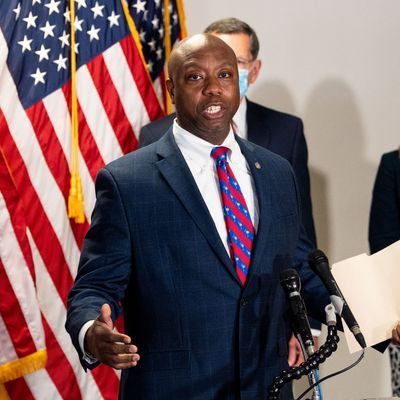
To understand the state of play on police-reform legislation in Washington, it’s important to remember that given divided control of Congress, bipartisan and bicameral negotiations will be necessary to enact anything of significance. Yesterday, Senate Republicans sought to enact their own version of police-reform legislation without any Democratic input or even committee hearings. With 60 votes necessary to proceed to consideration of the bill, Republicans needed seven Democratic votes to move ahead and only got three (Doug Jones, Angus King, and Joe Manchin). So now Republicans have the choice of taking their ball and going home, opening negotiations with Senate Democrats, or waiting for the imminent House passage of a Democratic police-reform bill and opening negotiations that include House Democrats.
The advantage House Democrats had in the race to pass legislation first was control of the floor; there are no filibusters in the House or any supermajority requirements to pass legislation. They did hold a formal markup of their bill in the Judiciary Committee to avoid the kind of breakneck pace the Senate pursued. But in the end, there’s a Democratic bill and a Republican bill, and both parties have to choice whether and when to negotiate. As always, the White House is the wildest of cards, particularly on this subject.
The substantive differences between the House Democratic and Senate Republican bills are large enough that serious negotiations are not a foregone conclusion. Vox’s Li Zhu describes them succinctly:
While Democrats’ wide-ranging bill, the Justice in Policing Act, addresses a national use of force standard and a raft of legal protections police currently have, Republicans’ Justice Act focuses more on data collection and training protocols. Both would incentivize state and local police departments to ban chokeholds, though Democrats’ legislation includes a federal ban as well.
Perhaps the biggest difference involves one of those “legal protections police currently have,” the court-invented doctrine of “qualified immunity” by which “government officials performing discretionary functions, generally are shielded from liability for civil damages insofar as their conduct does not violate clearly established statutory or constitutional rights of which a reasonable person would have known,” to quote the key Supreme Court decision on the subject. That typically means law enforcement officers using physical force against citizens don’t have to worry about the kind of lawsuits anyone else might risk in crossing the line into violence. The House bill strips police officers and correctional personnel of this immunity in federal courts, while the Senate bill is silent on it. Chief Senate Republican police reform sponsor Tim Scott has called any change in qualified immunity a “poison pill.”
With the House poised to pass its bill this week, we’ll soon see if negotiations begin or if instead both parties decide to promote their competing “messages” on police reform and let this become a 2020 campaign issue. One thing is clear: No legislation that could survive a Senate vote and secure Donald Trump’s signature is going to satisfy the national protest movement that placed police misconduct on the front burner. Black Lives Matter activists among others are insisting on the more systemic reforms associated with the “defund the police” slogan. For their part, congressional Democrats (and for that matter, presidential candidate Joe Biden) have all read polls showing every kind of “police reform” commanding strong popular support — which is decidedly not the case for “defunding the police.”
So politicians in both parties may be happy enough with their public posture to kill any real momentum toward a compromise, particularly if the White House’s position is in doubt. As before, though, developments in the streets could change the political equation.






























